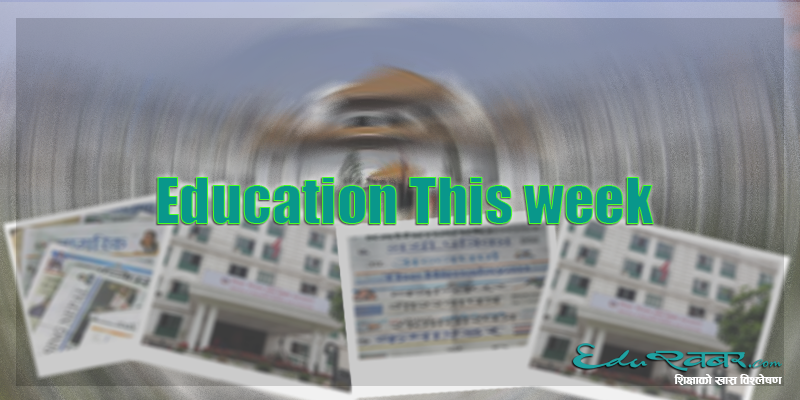Kathmandu - This week the government unveiled National Education Policy while the experts claimed that the policy was reformed to address the interest of the private schools. A rural municipality distributed First aid box to all schools along with compulsory first aid training to ensure access to emergency first aid response in hilly terrain. Protest by Employees association at KU was also reported this week. CIAA called on the local governments to stop arbitrary appointment of teachers. Arrangement of Hundred Fifty Thousand teachers by Education minister was also reported this week. Opinion articles this week discussed about the requirement of research based academic practices in higher education institutions for prosperous future.
|
Abbreviations: MoEST- Ministry of Education, Science and Technology, TU- Tribhuwan University, IOM- Institute of Medicine, TUSC-TU Service Commission, KD-Kantipur Daily, THT- The Himalayan Times, PM- Prime Minister, CTEVT-Council for Technical Education and Vocational Training, KMC- Kathmandu Metropolitan City, SMC- School Management Committee,VC- Vice Chancellor
|
- The government announced National Education Policy-2019 this week. The policy envisions guiding the entire education sector in line with the federal democratic republic system of the country. Compulsory and free basic education for all is one of the salient features of the policy. The policy aims to make all levels of education competitive, technology friendly, employment oriented and productive. “Nepal will be developed as an education hub that provides world-class education in specific subjects,” reads the policy. The policy mentions of including ayurveda in health subjects such as e-medicine, dentistry, nursing, public health and pharmacy. The central concept of the policy is ‘Technical education for all.’ As per the policy all the staffers at schools will be appointed through the Teachers’ Service Commission, on merit basis. Professional code of conduct will be made for all teachers, principals and school staffers, according to the policy.The policy has also mentioned that local government should effectively regulate private schools on the basis of guideline and work procedure formulated by the federal government. The policy also envisions of education counseling services. “Performance evaluation of teachers will be based on learning achievements of students,” the media quoted the policy document.
- Another news reported that the government has stepped back from its own announcement to turn private schools into non-profit by the period of 10 years. The Report of the High Level National Commission on Education had stated that all schools would be bought under same structure, and that education will not be run under profit motive institutions. Some education experts have commented that the National Education Policy was against the spirit of the constitution. Associations of Private Schools have taken this as a victory. The Policy also contradicts with the constitution by allocating responsibility of public schools as a shared responsibility between local, provincial and federal government, while the constitution clearly states that school education is sole responsibility and authority of the local government. An expert stated that the private schools investments where affiliated to political parties and therefore the government couldn’t disconnect itself from the interest of the private school operators. The private school's association was reported to express discontent about the policy that opened way for public schools to receive donations from foreign aid. The policy opens gate to establish pre-primary private schools and to run schools in private structures.
- An article reported CIAA called local governments to stop arbitrary appointment of teachers. The Commission for the Investigation of Abuse of Authority has directed local levels not to reappoint any school teacher who retired from service as part of the golden handshake scheme offered by the government. An inquiry conducted by the anti-graft body had suggested that some community schools had reappointed temporary teachers, who could not attain permanent status through open competition for years. According to a report of the anti-graft body, municipalities and rural municipalities were indulged in creating new positions and appointing teachers without complying with the prescribed criteria and procedures to provide jobs to the relatives of local level office-bearers. “No local level or school is authorized to create new positions of teachers incontravention of the number of posts sanctioned by the Ministry of Education,Science and Technology,” the report read.As per the Local Government Operation Act-2017, local levels shall only adjust theposition of teachers and support their capacity development state the report.
- An opinion article discussed that if the universitiesdoesn’t conduct relevant research, and the political leaders fail to realize the importance of academic research, then these agencies end up being a tool for the interest of political parties. The article discussed about the weak history of relevant research efforts in universities of Nepal, the lack of autonomy and the pressure of political forces that restricted academicians from conducing fair and sincere research particularly in socio-political field. The raising complexity of the global and regional geo-political context and the call for systemic change being called in international civil movements called for need of timely research which can only happen once the academic institutions become a autonomous bodies to ensure independent research and competent leadership.
The students protesting against the corruption in medical education has stated the commitment of Chitwan Medical College to return all fees as a conspiracy to end student protest. The students have also called for investigation on finding for a pistol in the college premises.
'Education this Week' is a joint effort put to analyze the press coverage of education in Nepal’s selected print media published in Kathmandu. The main aim of this effort is to identify and explain major education issues picked up by the media and give back and foreground of the news.This, we believe, will help policy makers and other responsible people to keep abreast with ongoing concerns and discussions on and around education. EduKhabar, in collaboration with the Center for Educational Policies and Practices (CEPP) , has produced this analysis based on the news printed in Kantipur (Nepali) and The Himalayan Times (English), Dailies andHimal Weekly(Nepali) betweenDec 11-17, 2019 (Mansir 25-Poush 1, 2076)- Editor.

प्रतिक्रिया